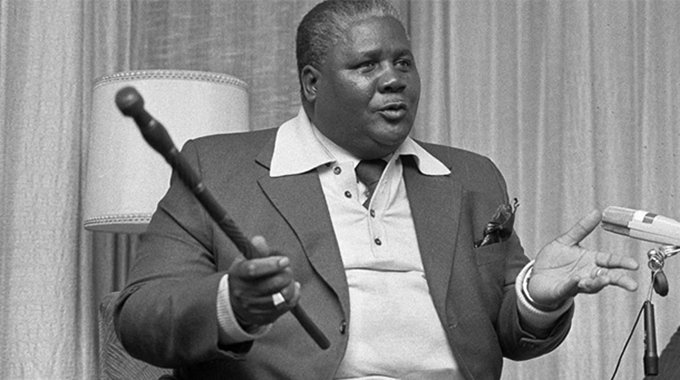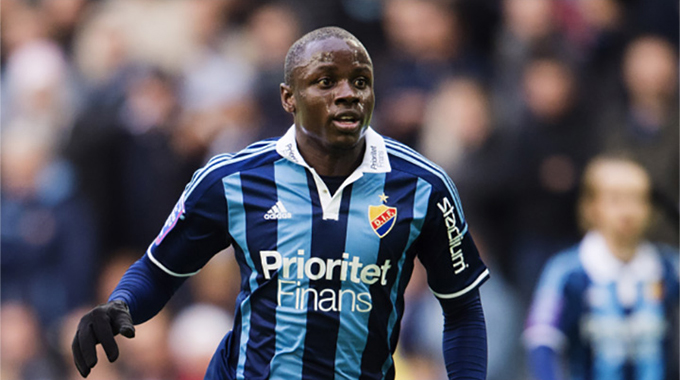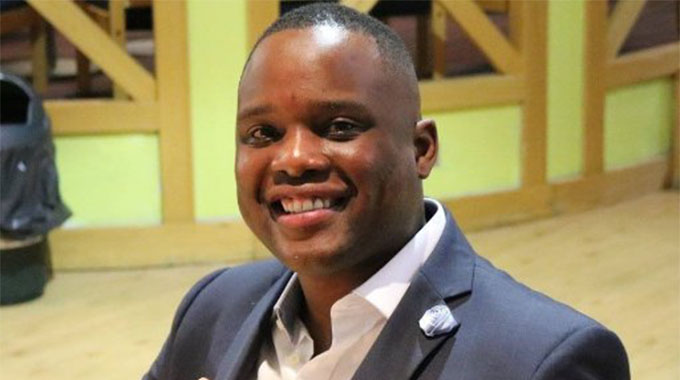Remembering Father Zim through his words

Elliot Ziwira Senior Writer
It is 20 years now since the passing on of Vice President Dr Joshua Mqabuko Nkomo, affectionately known as Father Zimbabwe, Chibwechitedza, uMdala Wethu, who crossed to the other side on July 1, 1999.
Because revolutionaries as human beings may die, their ideas and legacies, as the Burkinabe revolutionary Thomas Sankara once said, live after them.
So it is with the Father of the Nation of Zimbabwe, Dr Nkomo, whose contribution to the liberation of the Motherland is testimony to his selfless love, dedication to unity and commitment to the upliftment of the people of colour.
In this instalment, we remember the iconic son of the soil through reflections on what he said during the course of the more than 30 years that he fought colonial injustices; and his dream of one people one nation.
Because the land, the African’s heritage and lifeline was close to his heart, the iconic national hero’s dream was to see his people living freely on the land of their ancestors.
On October 12 1963, he told a gathering of 5 000 people at a nationalist meeting in Mufakose, Salisbury:
“We have come here today because of the call of our land. You are part of a great struggle to free a great continent, and now you have a duty to free Zimbabwe. We are coming to an end of that struggle. With only two or three months left, we must prepare and see to it there is unity everywhere” (The Sunday Mail, 13 October, 1963).
In August 1963, he put up his car valued at 250 pounds to meet part of a 350 pounds bail bond granted by the High Court in Bulawayo, to his friend and former top official of his banned party, Jason Ziyaphapha Moyo. Mr L Kunaka provided the other cash bail of 100 pounds.
In October 1962, Umdhala Wethu was restricted to a village in Kezi, in the Semokwe Reserve, Plumtree District, his birthplace, near St Joseph’s Mission, where he was sharing a thatched hut with three other relatives.
It was reported that journalists from around the globe thronged the place “with NBC and BBC cameramen setting up TV cameras on tripods and reporters moving around the kraal, or talking to Mr Nkomo” turning everything into “something like a film lot,” (Evening Standard, October 24, 1962).
He told the gathering journalists: “This is the last interview I will give in English.
“The English language represents what has put me here today.”
When he received a brand new Vauxhall car as a gift from his “people all over Southern Rhodesia” in October 1962, during his time in restriction, a journalist asked him what good a new car would be to him as a restricted person, and he responded:
“Perhaps I’ll take a daily ride round my three-mile restriction limit. Now my people are making my stay here as comfortable as possible. Visitors from all over have brought me everything I need in the way of food, live goats and two dozen chickens.” (Evening Standard, 11 October 1962).
On September 15 1979, he assured the Zimbabwe-Rhodesia’s white population that the Patriotic Front had no plans to purge them since there was no “charter of fear” in their constitutional plans.
He said: We can assure our white fellow citizens that we accept them as we accept ourselves. They have nothing to fear.”
Citing Jim Reeves’ song “A Stranger’s Just a Friend” with the line, “A stranger is just a friend you do not know”, he added: “It is possible that’s their problem. We are friends they (the whites) do not know.” (The Sunday Mail 16 September 1979).
In October 1976, in Geneva, Switzerland, he told Denis Sargent in an interview that the Patriotic Front of his ZAPU and Robert Mugabe’s ZANU was there to stay as the two liberation movements were “fighting to build a nation of people, not of tribes or nations, or colours.”
Of the Patriotic Front’s commitment to unity and permanence of will he said. “(In) the few weeks of its existence, it appears we are getting closer and closer. Much more understanding is developing between us.
“We are working for harmony. It is very important for the two liberation movements with some sort of armies to harmonise to avoid the possibility of a clash.
“If these young people can be turned into a regular force to defend the Independence of their country that they had been fighting to achieve, it could save the country from the horrors of civil war.”
On the future, he told Denis Sargent: “I have something I want to say. People are worrying about what sort of future there will be for them, in particular people of white descent. They look at the future and think the African leaders, particularly those of the liberation movements, would like to see whites wiped out. This is completely mistaken.
“No one is fighting white people as white people. I have struggled almost 30 years to remove an evil, the separation of people by races.
“I could not at the end of it find myself applying what I was fighting against. We regard people as people, and white people as people like ourselves, with the emphasis on the people, not on the white.
“Those of our white friends in that country (Rhodesia), who decided to make that country their home are just as much citizens as anyone else. The future we are fighting for is a future of respect for human rights.
“I could never be party, nor could my colleagues, to a regime which relegated the rights of other people to a position of inferiority because they were a minority in the country.”
Still in Geneva for the conference (Geneva Conference), he sent a personal message to his people in Rhodesia on October 24, 1976: “We have come here to do a job that will sort out the injustices we have been fighting for years. We are in Geneva today to do a job which started years back — to work out a constitution that will give the people of Zimbabwe the right to choose their own government.
“I hope that those who are in control of the country and the people realise the responsibilities on their shoulders.
“The struggle nor the dangers are yet over. But we are at the beginning of the end of the problem” (Rhodesia Herald, October 25, 1976).
“We are doing everything in our power to achieve unity and we believe we shall achieve it. If unity fails, we must give an account of why it failed. But when you bring groups of people together, they must be prepared to forgo some of their rights.
“This happens if our unity is to be meaningful. This must apply to both sides,” he told journalists on March 14, 1987 during the unity talks between PF-ZAPU and ZANU-PF.
In 1988 he said: “The first struggle, that of liberation, is over and now we are faced with the struggle to create a nation and for development to eliminate the problems that have faced us for almost a hundred years.”
On February 16 1980, Dr Nkomo, told about 5 000 people at Mandava Stadium in Zvishavane that they should not be afraid to choose leaders they believe would represent their aspirations, because the war was not fought by people with guns alone.
He said: “This country wasn’t freed just by men with guns, as some will tell you.
“It was a combination of all of you. You must now combine to give a reasonable government that will see to it that this country is peaceful.
“There are stories going around that this country is going to be divided. It must not be divided, and all leaders must warn their followers against this sort of thing.
“Our primary task is to create one nation. All those fighters in unmarked graves died to liberate all of Zimbabwe as a single nation.
“Although we are independent, we are not fully free. We cannot be free if people are afraid to go from one place to another.
“It would be terrible and what would the world say if we used the weapons we got to free our country against each other.
“We must unity and be an example”, he told The Herald on September 27, 1988.
Opening the Nkayi District Council at an occasion attended by 5 000 people, Dr Nkomo told councillors that they were not above the people who elected them, because councillors are “people’s people”.
He said: “Councillors are there for the benefit of the people and must work for the development of the area.
“No country is without problems, and there will always be problems. As some problems are solved, new ones will arise. We must all work to solve the problems as they come” (The Herald March 30, 1981).
On resettlement, he called for patience as more land was being sought by the Government since it would not “happen overnight”.
“When you eventually get your land, make sure you know how to use it. We do not want to see this country turned into a desert,” Umdala Wethu said (The Herald March 30, 1981).
“People of Zimbabwe are one and there is no Shona or Ndebele, but there is one Zimbabwe,” Father Zimbabwe said at a rally in Victoria Falls on October 16 1982 (The Sunday Mail 17 October 1982).







Comments